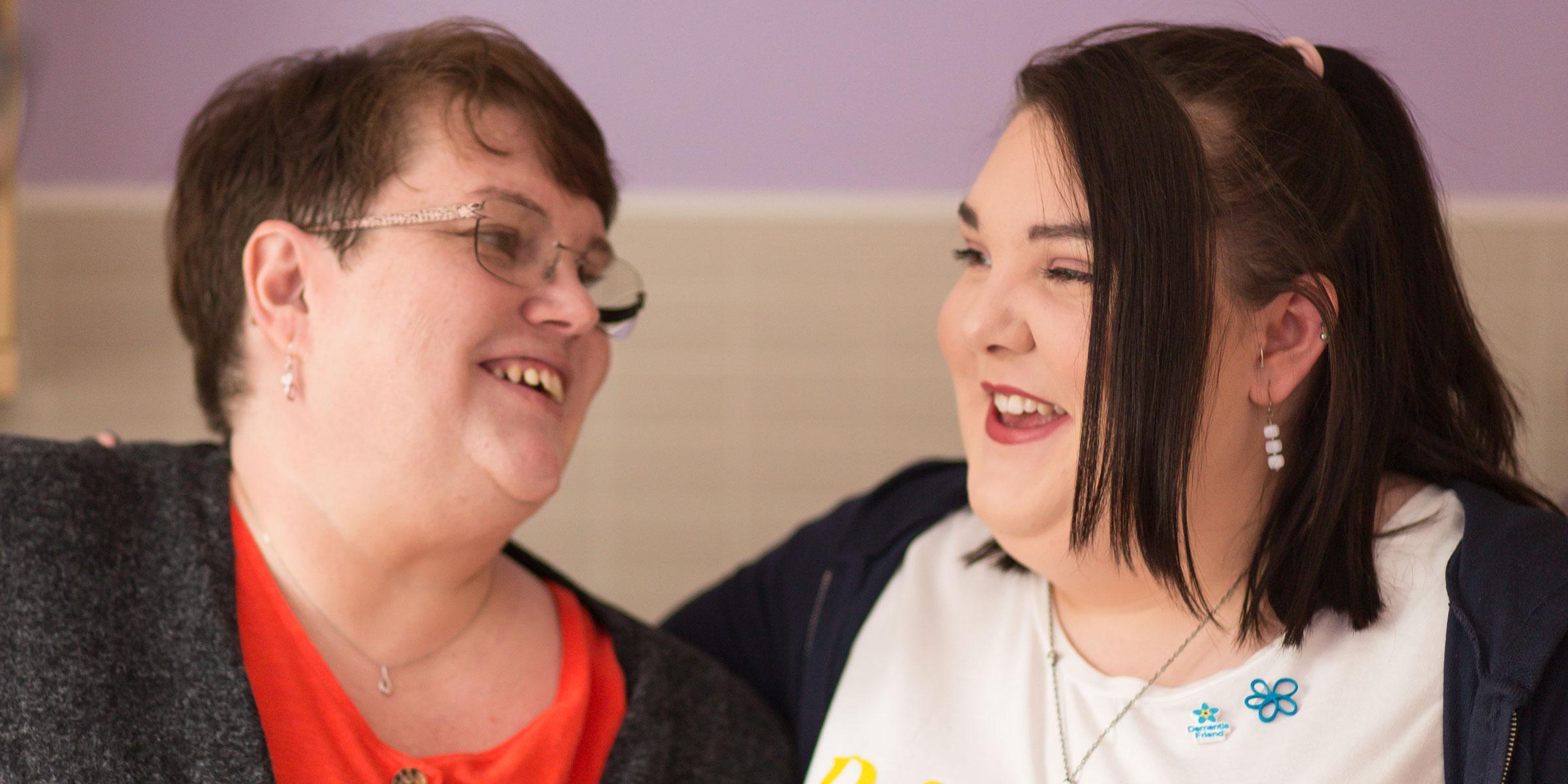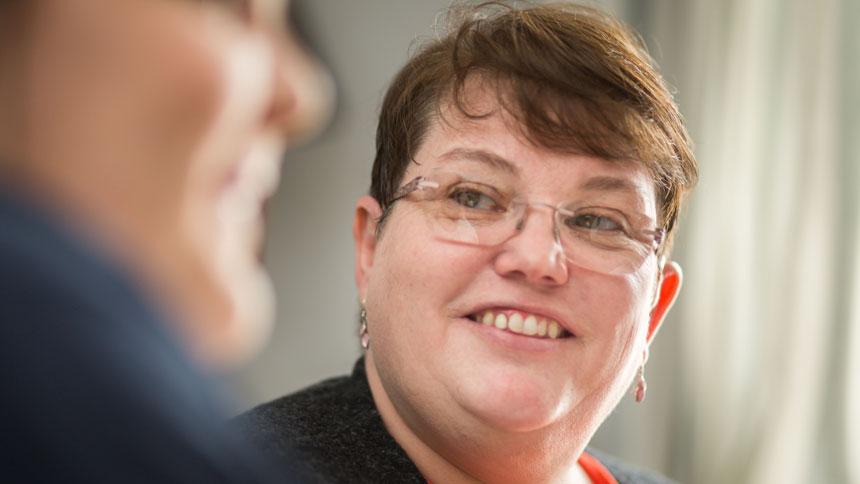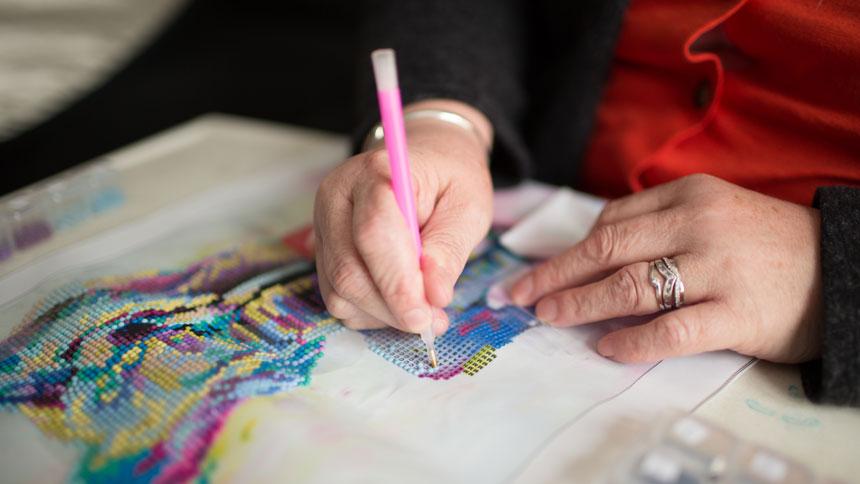
You’re not alone: Keeping in touch and having a say, despite dementia and coronavirus
Diagnosed with dementia while still in her 40s, Amanda Quinn wants others to know they have a voice.
‘It’s daunting as to what’s going to happen,’ says Amanda Quinn of the coronavirus lockdown. ‘Even the thought of going back out once this is lifted is quite frightening.’
When we spoke in May, Amanda hadn’t left her home for weeks. This is because, as well as living with dementia and diabetes, she doesn’t have a spleen.
Being without the organ – an important part of most people’s immune system – means Amanda is at greater risk of severe illness from coronavirus.
‘It leaves you feeling very insecure,’ says Amanda, 51, who lives with her husband and two of her children in Rhondda Cynon Taf, south Wales.
Press the orange play button to hear Amanda’s story in her own words – and hear how she was doing when we caught up with her in late July:
Amanda is finding media and social media coverage of the virus particularly unhelpful.
‘I think the way they are going on about it is beginning to make people paranoid about what’s going to happen,’ she says.
‘They need to start focusing on something more positive that’s going to come out of this, because something has to.’
Amanda is trying to pass the time and switch off from the world around her by reading and doing adult colouring. She is also receiving regular calls from friends, family and Alzheimer’s Society to check on her wellbeing.
Amanda would usually attend monthly meetings of Memoria – a theatrical group of people with dementia and carers, facilitated by the charity Re-Live. As this isn’t possible right now, the group is keeping in touch through weekly video calls instead.
Naturally, Amanda is still finding things very difficult.
‘It’s kind of claustrophobic in a way,’ she says. ‘I’m not seeing the people I used to see. I miss my two older boys.
‘I don’t even know what day it is – I’ve lost track of everything.’
Don’t leave me
Amanda is from the Scottish town of Helensburgh, about 30 miles north-east of Glasgow. She moved to Wales with her four children around 17 years ago to escape a violent marriage.
She married her second husband Steve – a long-distance lorry driver – four years ago, and they live with her son George and daughter Bethany. Amanda previously worked as a nursery nurse and a chef.
Amanda was diagnosed with young-onset Alzheimer’s disease in early 2018, age 49. Her son has Asperger’s and it was his social worker who first noticed that something wasn’t right.
‘She kept saying that I should really see a doctor, but I thought, “I’m not bothering, there’s nothing wrong with me,”’ says Amanda.
Amanda did visit the doctor about an ear problem, though at the start of the appointment she couldn’t remember why she was there. She was referred for memory tests, which she thought would be a waste of time.
‘I got a bit agitated,’ she recalls. ‘I said, “These stupid tests are making me look thick.”’
Those tests, along with scans and blood tests, led to a dementia diagnosis.
‘They told me I could have had it for a few years,’ says Amanda. ‘The first thing I said to my husband was, “Please don’t leave me.”’

To make matters worse, the medical consultation was concluded in front of a full waiting room.
‘I felt so belittled,’ says Amanda. ‘I got into the car and burst out crying. I felt humiliated and had just been given this death sentence that wasn’t going to go away.
‘The way I was treated when I had my diagnosis was appalling. I was sent away with a prescription and nobody contacted me for nearly six months. You can’t do that to people, it’s cruel. You need a bit of compassion and understanding.
‘I kicked up such a fuss that now when you get diagnosed, you come out from the doctor and see a member of the memory team for information and Alzheimer’s Society contacts.’
Taboo topic
Amanda’s lifestyle and personality have changed as a result of her dementia.
‘I can’t remember what I’m meant to do on a day-to-day basis,’ she says. ‘I used to be very house proud, everything was in its place, but now I can’t remember how to do it all. I can’t remember how to cook. My sense of humour is not the same, it’s gone.’
Amanda also has incontinence, a topic that she feels deserves greater discussion.
‘It’s quite a big issue in my life,’ she says. ‘I can’t leave the house without a changing bag of wipes and clean clothing.
‘It’s such a taboo subject. I was one of the ignorant ones who thought dementia only happened to old folk. And even when it happened to me, I thought it was only memory loss.
‘People need to be made aware of what challenges can come with dementia, and unfortunately incontinence is one of them.’
Amanda’s husband Steve is often away working for long periods and phones home several times a day. Her older boys would visit under normal circumstances, but daughter Bethany is her main carer.
‘Bethany does everything really,’ says Amanda. ‘She takes me to appointments and does all the cooking and bill paying, and now she’s doing all the shopping.
‘She wants to go to university and become a midwife, but at the moment she’s put that on the back burner to be there for me.’
Any age
Amanda has developed good relationships with several Alzheimer’s Society staff.
‘They’re always there to give me that bit of help and support which sometimes I might need,’ she says. ‘It’s everything really – practical advice, emotional support. They’re reassuring. If I ever need to talk, I can pick up the phone.
‘It’s my family, friends and Alzheimer’s Society that pick me up if I’m feeling down.’

Amanda takes part in one of our Focus on Dementia Network groups, where people affected by dementia share their experiences to influence the work of the Society and other organisations. She also speaks at conferences and has shared her story through the Society and national media.
‘It’s important for people to be aware that dementia can affect any age. It’s not only an old person’s disease,’ she says. ‘It could happen to them.’
‘People also need to realise that you don’t have to suffer with dementia, you can live with it.
‘You still have a voice to be heard, you still have rights. You’re still that person who brought them up as children or befriended them. Things have changed you, but you haven’t changed.’
Amanda feels that dementia awareness is sadly lacking among some sections of the public. She recalls one incident where two men were sat in her and Bethany’s reserved seats on a train.
‘Bethany said that I had dementia and I got a mouthful of abuse,’ she says. ‘The man was screaming, “People like you need to be locked away, you’re a danger to society.” When we got back, I just cried.’
Hopes and dreams
As she considers how her dementia might progress, Amanda is more concerned with her children’s future than her own.
‘I still have hopes and dreams, although whether they’ll happen, I don’t know,’ she says.
‘But it worries me, how it will affect my children. I’m fortunate, I suppose, that I’m not going to know.
‘I say I don’t want to go into a care home but that’s not fair on them – they still have their lives to lead.’
Looking ahead, Amanda shares Alzheimer’s Society’s desire to defeat dementia through research.
‘We need to find a cure,’ she says. ‘It won’t be in my lifetime, but there needs to be a cure for future generations.’
We need your help
We can’t keep our phone lines open or manage the increase in demand for our services without urgent financial support. Please donate today – with your help, we can show people living with dementia that they aren’t alone.



